-
 Bitcoin
Bitcoin $83,443.6737
-1.76% -
 Ethereum
Ethereum $1,825.6264
-3.20% -
 Tether USDt
Tether USDt $0.9997
-0.02% -
 XRP
XRP $2.0597
-2.32% -
 BNB
BNB $597.9023
-1.48% -
 Solana
Solana $119.3459
-5.03% -
 USDC
USDC $0.9999
-0.01% -
 Dogecoin
Dogecoin $0.1660
-3.39% -
 Cardano
Cardano $0.6523
-3.11% -
 TRON
TRON $0.2359
-1.14% -
 Toncoin
Toncoin $3.8299
-5.08% -
 UNUS SED LEO
UNUS SED LEO $9.3665
0.55% -
 Chainlink
Chainlink $13.1586
-4.88% -
 Stellar
Stellar $0.2618
-2.77% -
 Sui
Sui $2.3705
0.07% -
 Avalanche
Avalanche $18.4778
-4.84% -
 Shiba Inu
Shiba Inu $0.0...01228
-1.59% -
 Hedera
Hedera $0.1637
-2.32% -
 Polkadot
Polkadot $4.0481
-1.61% -
 Litecoin
Litecoin $83.0708
-0.33% -
 MANTRA
MANTRA $6.3449
1.40% -
 Bitcoin Cash
Bitcoin Cash $299.2669
-2.15% -
 Bitget Token
Bitget Token $4.5420
-2.09% -
 Dai
Dai $0.9999
0.00% -
 Ethena USDe
Ethena USDe $0.9999
0.02% -
 Pi
Pi $0.6659
-4.49% -
 Hyperliquid
Hyperliquid $12.4532
-5.21% -
 Monero
Monero $215.7704
-0.13% -
 Uniswap
Uniswap $5.9598
-3.90% -
 Aptos
Aptos $5.2030
-1.76%
How does the holding period of a Bitcoin ETF affect returns?
The holding period significantly impacts Bitcoin ETF returns; longer periods may yield higher returns but increase risk, while shorter periods offer liquidity but higher volatility.
Mar 28, 2025 at 05:21 pm
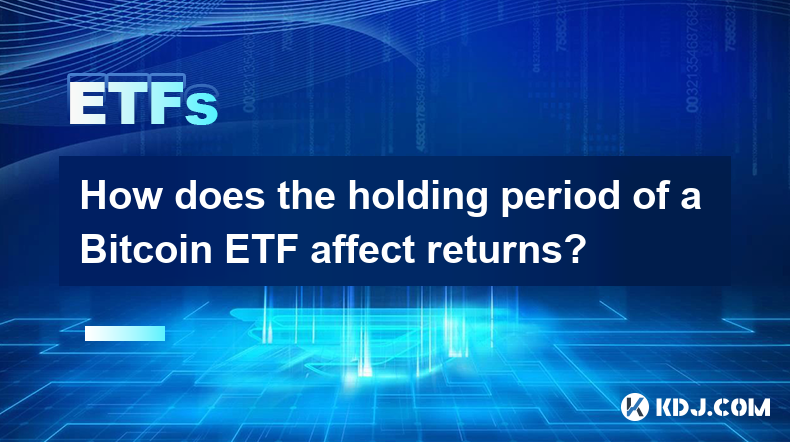
Understanding the Impact of Holding Period on Bitcoin ETF Returns
The performance of a Bitcoin ETF, like any investment, is significantly influenced by the investor's holding period. A longer holding period generally allows for greater potential returns, but also introduces more risk. Conversely, shorter holding periods minimize risk but may limit potential gains. This is due to the inherent volatility of Bitcoin and the associated market fluctuations. Understanding this relationship is crucial for making informed investment decisions.
Volatility and Holding Period
Bitcoin's price is notoriously volatile. Short-term price swings can be dramatic, leading to substantial gains or losses depending on the entry and exit points. A shorter holding period exposes investors to this volatility more directly. Holding for a shorter period increases the likelihood of experiencing losses if the market dips during your investment timeframe. Longer holding periods, however, allow for the averaging out of these fluctuations, potentially leading to higher overall returns.
Long-Term Holding Strategies
Long-term investing strategies often aim to ride out short-term market corrections, capitalizing on the potential for Bitcoin's price to appreciate over time. This approach requires patience and a tolerance for risk. However, historical data suggests that Bitcoin has shown significant growth over longer periods, despite experiencing periods of substantial price drops. This makes a long-term approach appealing to many investors.
Short-Term Trading and its Risks
Short-term trading, on the other hand, involves frequent buying and selling of Bitcoin ETF shares to capitalize on short-term price movements. This approach requires a high level of market knowledge, technical analysis skills, and a higher risk tolerance. The risk of losses is significantly higher with short-term trading due to the inherent volatility of Bitcoin. Successful short-term trading often relies on precise timing and market prediction, which is challenging even for experienced traders.
Factors Affecting Returns Beyond Holding Period
It's important to remember that the holding period isn't the only factor influencing returns. Other crucial elements include:
- Market conditions: Broader economic trends, regulatory changes, and overall investor sentiment can significantly impact Bitcoin's price.
- ETF expense ratio: The fees charged by the ETF provider will directly reduce the overall returns.
- Timing of entry and exit: Even with a long-term strategy, the specific timing of buying and selling can significantly affect profitability.
- Tax implications: Capital gains taxes on profits will also impact your net returns.
The Importance of Diversification
Diversification is crucial when investing in Bitcoin ETFs or any other asset class. Don't put all your eggs in one basket. Spreading your investments across different assets can mitigate risk and improve your overall portfolio performance.
Impact of Regulatory Changes
Regulatory developments regarding Bitcoin and cryptocurrencies can significantly impact the price and, consequently, the returns of a Bitcoin ETF. Positive regulatory changes often lead to price increases, while negative news can trigger sell-offs. Staying informed about regulatory developments is crucial for managing risk.
The Role of Market Sentiment
Market sentiment plays a significant role in Bitcoin's price fluctuations. Periods of strong positive sentiment often lead to price increases, while negative sentiment can cause sharp drops. Understanding market sentiment is challenging but can be helpful in making informed investment decisions, particularly for short-term trading.
Expense Ratios and Their Impact
The expense ratio of a Bitcoin ETF directly impacts returns. A higher expense ratio means a larger percentage of your returns will go to the ETF provider as fees. Comparing expense ratios across different Bitcoin ETFs is essential to maximize your potential returns. Choosing a low-expense-ratio ETF can significantly improve your overall profitability.
Tax Implications of Bitcoin ETF Investments
Capital gains taxes on profits from Bitcoin ETF investments vary depending on the jurisdiction and holding period. Understanding the tax implications is crucial for accurate return calculations and long-term financial planning. Consult with a tax professional to understand the specific tax implications in your region.
Risk Tolerance and Investment Strategy
Your risk tolerance should significantly influence your chosen holding period and overall investment strategy. Conservative investors may prefer longer holding periods to mitigate short-term volatility, while more aggressive investors might opt for shorter-term trading strategies.
Long-Term vs. Short-Term Investment Horizons
Long-term investment horizons generally offer greater potential for higher returns due to the potential for long-term Bitcoin price appreciation. However, short-term investments offer greater liquidity but are exposed to higher volatility and risk.
The Influence of Technological Advancements
Technological advancements in the Bitcoin ecosystem can also influence the price and, consequently, the returns of a Bitcoin ETF. Positive developments, such as scaling solutions, often lead to price increases, while negative news can trigger sell-offs. Staying informed about technological advancements is essential for informed investment decisions.
Frequently Asked Questions
Q: What is the ideal holding period for a Bitcoin ETF?
A: There's no single "ideal" holding period. It depends entirely on your individual risk tolerance, investment goals, and market outlook. Long-term holding generally offers better potential returns but involves greater risk, while short-term trading is riskier but offers greater liquidity.
Q: How does the volatility of Bitcoin affect ETF returns?
A: Bitcoin's volatility directly impacts ETF returns. Short-term price swings can lead to significant gains or losses, particularly for shorter holding periods. Long-term holding can help average out these fluctuations.
Q: Are there any risks associated with investing in Bitcoin ETFs?
A: Yes, investing in Bitcoin ETFs carries risks, including price volatility, regulatory uncertainty, and the potential for security breaches. Diversification and careful research are crucial.
Q: How do expense ratios affect my returns?
A: Expense ratios are fees charged by the ETF provider, directly reducing your overall returns. Choosing a low-expense-ratio ETF is essential to maximize your potential profit.
Q: What are the tax implications of investing in Bitcoin ETFs?
A: Tax implications vary depending on your jurisdiction and holding period. Consult a tax professional to understand the specific tax implications in your region.
Disclaimer:info@kdj.com
The information provided is not trading advice. kdj.com does not assume any responsibility for any investments made based on the information provided in this article. Cryptocurrencies are highly volatile and it is highly recommended that you invest with caution after thorough research!
If you believe that the content used on this website infringes your copyright, please contact us immediately (info@kdj.com) and we will delete it promptly.
- Grayscale Investments Launches Two New Bitcoin (BTC) Exchange-Traded Funds (ETFs)
- 2025-04-03 09:15:12
- US President Donald Trump announced reciprocal tariffs against every country with a trade relationship with the US
- 2025-04-03 09:15:12
- BlockDAG Launches Beta Testnet With $200M Raised, Ethereum Approaches $2,000 & Tether Expands Into Media
- 2025-04-03 09:10:12
- Trump Announces New Base Tariff of 10% on All Countries, Targeting EU and Japan with Higher Duties
- 2025-04-03 09:10:12
- Fidelity launches new retirement accounts that will allow Americans to invest in crypto nearly fee-free
- 2025-04-03 09:05:12
- AAVE Price Dipped Following Large-Scale Whale Sell-offs, But Technical Charts Hint at a Potential Bullish Reversal
- 2025-04-03 09:05:12
Related knowledge
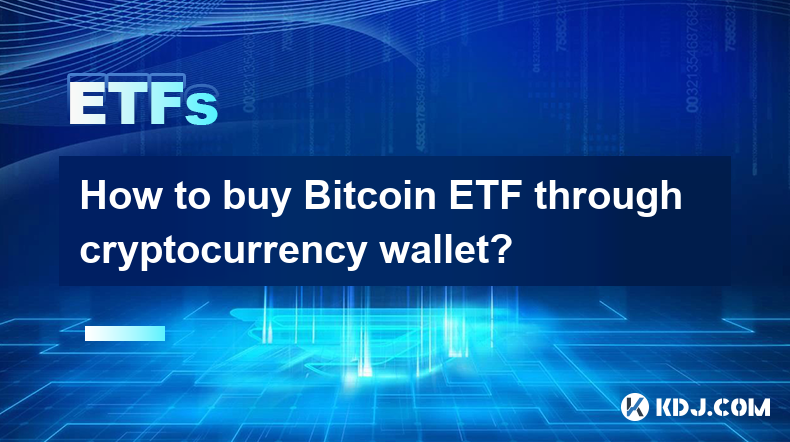
How to buy Bitcoin ETF through cryptocurrency wallet?
Mar 30,2025 at 08:22pm
It's important to understand that you cannot directly buy a Bitcoin ETF through a cryptocurrency wallet. Cryptocurrency wallets are designed to hold and manage digital assets like Bitcoin itself, not exchange-traded funds (ETFs). Bitcoin ETFs are traded on traditional stock exchanges, not decentralized cryptocurrency exchanges. Therefore, the process i...
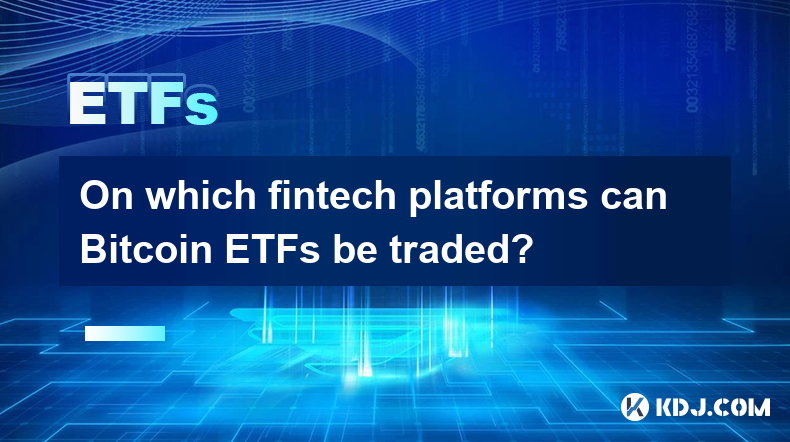
On which fintech platforms can Bitcoin ETFs be traded?
Mar 28,2025 at 09:21am
Navigating the Bitcoin ETF Landscape on Fintech PlatformsThe availability of Bitcoin ETFs on fintech platforms is a rapidly evolving landscape. Currently, the approval and subsequent listing of Bitcoin ETFs are subject to regulatory hurdles and vary significantly by jurisdiction. Therefore, the specific platforms offering Bitcoin ETF trading depend hea...
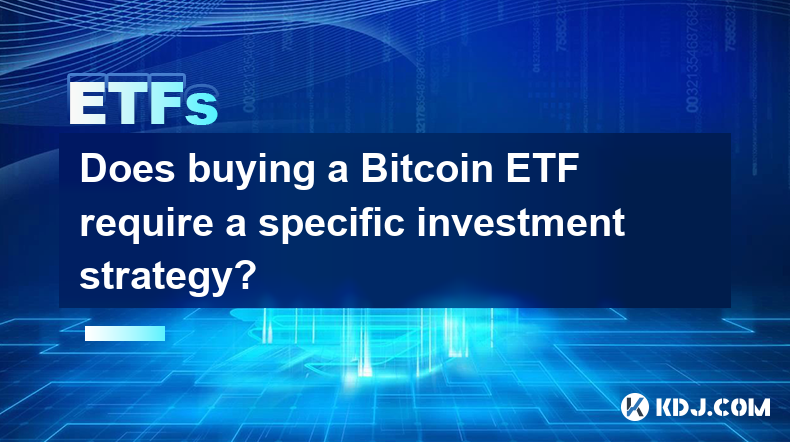
Does buying a Bitcoin ETF require a specific investment strategy?
Mar 27,2025 at 06:36pm
Understanding Bitcoin ETFs and Investment StrategiesA Bitcoin Exchange-Traded Fund (ETF) is a type of investment fund that tracks the price of Bitcoin. Investing in a Bitcoin ETF offers exposure to the cryptocurrency market without the complexities of directly owning and securing Bitcoin. However, like any investment, a successful strategy requires car...
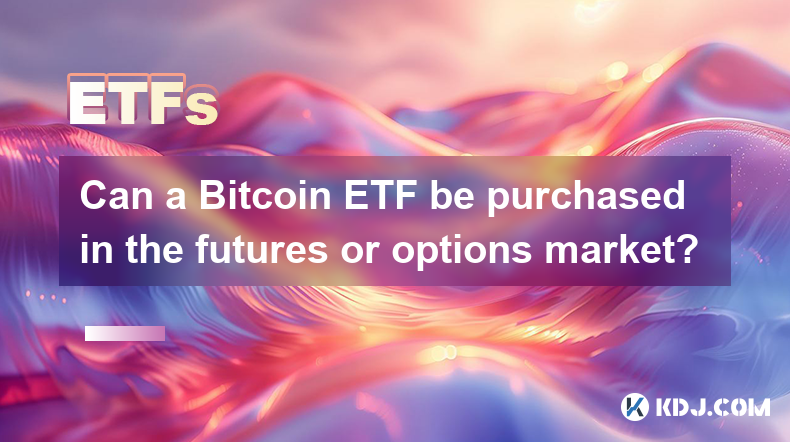
Can a Bitcoin ETF be purchased in the futures or options market?
Mar 27,2025 at 02:49am
Understanding Bitcoin ETFs and Derivative MarketsA Bitcoin ETF (Exchange-Traded Fund) is a fund that tracks the price of Bitcoin. Unlike directly buying Bitcoin, an ETF offers a more regulated and accessible way for investors to gain exposure to the cryptocurrency market through traditional brokerage accounts. However, the availability of a Bitcoin ETF...
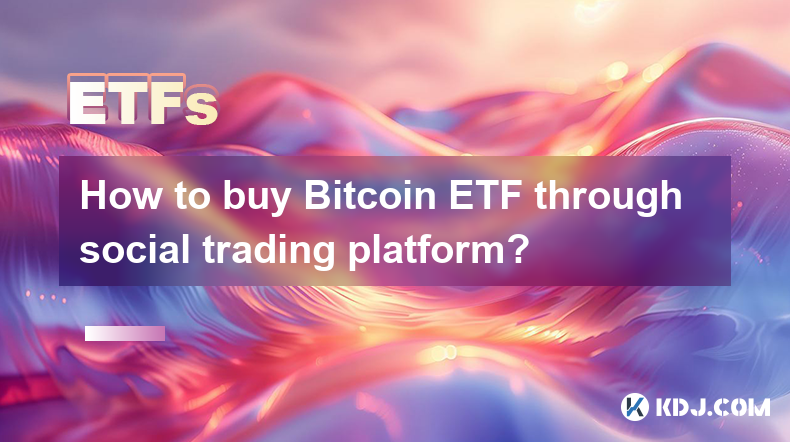
How to buy Bitcoin ETF through social trading platform?
Mar 27,2025 at 10:43am
How to Buy Bitcoin ETF Through Social Trading Platforms? Understanding Bitcoin ETFs and Social TradingA Bitcoin ETF (Exchange-Traded Fund) is a fund that tracks the price of Bitcoin. Unlike directly buying Bitcoin, an ETF offers a regulated and potentially less volatile way to gain exposure to the cryptocurrency market. This is because ETFs are traded o...
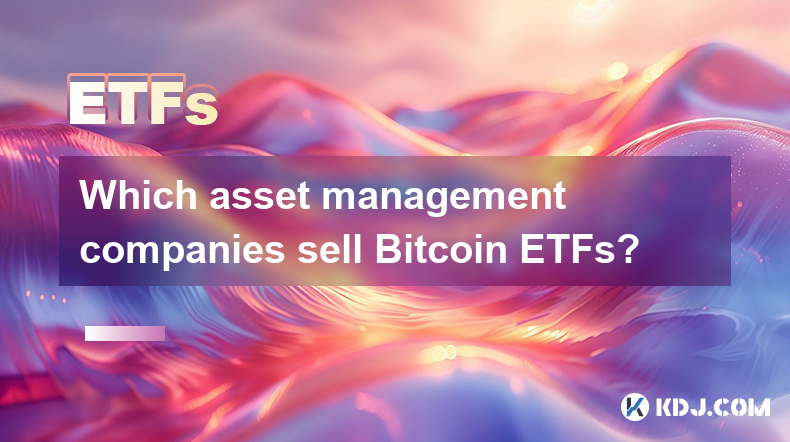
Which asset management companies sell Bitcoin ETFs?
Mar 28,2025 at 02:21am
The Current Landscape of Bitcoin ETF OfferingsCurrently, no asset management company offers a fully-fledged, SEC-approved Bitcoin ETF in the United States. While several companies have filed applications, the Securities and Exchange Commission (SEC) has yet to approve any. This is primarily due to concerns surrounding market manipulation, investor prot...

How to buy Bitcoin ETF through cryptocurrency wallet?
Mar 30,2025 at 08:22pm
It's important to understand that you cannot directly buy a Bitcoin ETF through a cryptocurrency wallet. Cryptocurrency wallets are designed to hold and manage digital assets like Bitcoin itself, not exchange-traded funds (ETFs). Bitcoin ETFs are traded on traditional stock exchanges, not decentralized cryptocurrency exchanges. Therefore, the process i...

On which fintech platforms can Bitcoin ETFs be traded?
Mar 28,2025 at 09:21am
Navigating the Bitcoin ETF Landscape on Fintech PlatformsThe availability of Bitcoin ETFs on fintech platforms is a rapidly evolving landscape. Currently, the approval and subsequent listing of Bitcoin ETFs are subject to regulatory hurdles and vary significantly by jurisdiction. Therefore, the specific platforms offering Bitcoin ETF trading depend hea...

Does buying a Bitcoin ETF require a specific investment strategy?
Mar 27,2025 at 06:36pm
Understanding Bitcoin ETFs and Investment StrategiesA Bitcoin Exchange-Traded Fund (ETF) is a type of investment fund that tracks the price of Bitcoin. Investing in a Bitcoin ETF offers exposure to the cryptocurrency market without the complexities of directly owning and securing Bitcoin. However, like any investment, a successful strategy requires car...

Can a Bitcoin ETF be purchased in the futures or options market?
Mar 27,2025 at 02:49am
Understanding Bitcoin ETFs and Derivative MarketsA Bitcoin ETF (Exchange-Traded Fund) is a fund that tracks the price of Bitcoin. Unlike directly buying Bitcoin, an ETF offers a more regulated and accessible way for investors to gain exposure to the cryptocurrency market through traditional brokerage accounts. However, the availability of a Bitcoin ETF...

How to buy Bitcoin ETF through social trading platform?
Mar 27,2025 at 10:43am
How to Buy Bitcoin ETF Through Social Trading Platforms? Understanding Bitcoin ETFs and Social TradingA Bitcoin ETF (Exchange-Traded Fund) is a fund that tracks the price of Bitcoin. Unlike directly buying Bitcoin, an ETF offers a regulated and potentially less volatile way to gain exposure to the cryptocurrency market. This is because ETFs are traded o...

Which asset management companies sell Bitcoin ETFs?
Mar 28,2025 at 02:21am
The Current Landscape of Bitcoin ETF OfferingsCurrently, no asset management company offers a fully-fledged, SEC-approved Bitcoin ETF in the United States. While several companies have filed applications, the Securities and Exchange Commission (SEC) has yet to approve any. This is primarily due to concerns surrounding market manipulation, investor prot...
See all articles
























































































